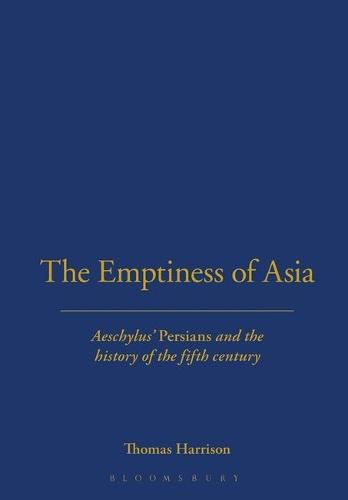Overview
This book provides aims to provide both a more satisfactory reading of the ""Persians"" and a richer picture of fifth-century history - the history both of events and of ideology.
Full Product Details
Author: Thomas Harrison
Publisher: Bloomsbury Publishing PLC
Imprint: Bristol Classical Press
Dimensions:
Width: 16.00cm
, Height: 1.90cm
, Length: 24.10cm
Weight: 0.447kg
ISBN: 9780715629680
ISBN 10: 0715629689
Pages: 240
Publication Date: 24 August 2000
Audience:
College/higher education
,
Professional and scholarly
,
Undergraduate
,
Postgraduate, Research & Scholarly
Format: Hardback
Publisher's Status: Active
Availability: Out of stock

The supplier is temporarily out of stock of this item. It will be ordered for you on backorder and shipped when it becomes available.
Reviews
The Emptiness of Asia by Thomas Harrison (Lecturer in Ancient History at the University of St. Andrews) is a literary study of Aeschylus' Persai alongside Herodotus' Histories, which will provide the reader with comprehensive understanding what actually happened at the battle of Salamis and afterwards. A scholarly dissection of political and ideological motivating factors underpinning Persai in the context of the times, The Emptiness of Asia is a fascinating and thoughtfully insightful analysis -- and a welcome addition to Hellenic Studies reference collections and supplemental reading lists. -- The Midwest Book Review
Aeschylus' Persians as the earliest surviving Greek drama and the only tragedy with an historical theme has been a critics battlefield for centuries. Harrison makes a sensitive literary reading to extract valuable, but carefully qualified, historical information from this classic text, attempting to avoid the previous subjective pitfalls of literary critics who treat the play as if it is in an historical vacuum and historians who claim too much on too little evidence. First performed in 472BC, the play's subject - the victory at Salamis eight years before - was still fresh in the minds of its audience. The play possesses a wealth of valuable evidence about the battle itself and 5th-century Athenian perceptions of themselves and their enemies. Triumphanalist but surprisingly sensitive, the play focuses on the Persian women left at court receiving the news of Xerses' defeat as 'the entire land of Asia mourns, emptied of its men.' Harrison examines how the constant stressing of the immensity of the Persian army, the greatness of their vices and the totality of their defeat reinforced the Greeks conception of the greatness of their victory and virtues. There is a great deal more to be extracted from the text about Athenian attitudes towards their growing empire and the internal conflict between proponents of democracy and tyranny. Harrison is careful but revealing in his conclusions and while this book may be dry to those not used to classical textual analysis it will be incisive and refreshingly objective to those who are. (Kirkus UK)
Author Information
Thomas Harrison is Professor of Ancient History at the University of St Andrews, UK. His publications includeDivinity and History: the religion of Herodotus (2000), and as editor Greeks and Barbarians (2002) and the Edinburgh Companion to Ancient Greece and Rome (2006).



